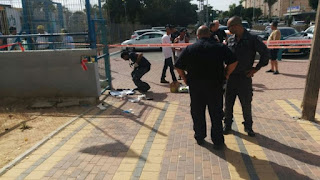A new kind of Intifada?
 |
| Scene of today's stabbing attack in Dimona, southern Israel. Credit: Haaretz/Police Spokeperson |
Palestinian
Authority (PA) President Mahmoud Abbas promised a “bombshell” in the run-up to
his speech at the UN General Assembly last week. Instead, he stated only that
the PA “cannot be bound” by the Oslo Accords. Since there is not much left of
the Oslo Accords, what this means remains an open question. Ayed Atmawi, a
Palestinian political activist and employee of the Geneva Initiative in
Ramallah, said that this could only mean the security cooperation between the
PA and Israel and that he, and Palestinians in general, now expected Abbas to
take that crucial step and end cooperation. At the same time, he was sceptical
that Abbas would do it, as he said that Abbas’s biggest concern was preventing
deaths on both sides. If he does not end cooperation, what can he do?
Security
cooperation or not, Abbas is likely to continue his strategy of the last few
years, which has been to raise Palestine’s visibility and legitimacy in
international institutions in a bid to up the pressure on Israel. These are the
“legal means” Abbas mentioned in his speech, including Palestine’s membership
of the International Criminal Court and its “Non-Member Observer State” status
at the UN. So far, these memberships have not resulted in concrete action
against Israel, but this is the eventual goal and international pressure is
indeed rising. As Kobi Michael of Israel’s Institute for National Security
Studies once told me, the fact that this new strategy eschews violence is a
sort of victory for Israel. At the same time, however, once “you have...
achieved a strategic achievement, the environment has [changed]... and you have
to be able to tackle the new challenges that [are] created in the environment
that you have influenced by your achievements”. It does not appear that Israel
is tackling its new environment particularly well.
Palestinians
are restless, increasingly impatient with a status quo that has seen little
change since the 1990s, with the great exception of the seemingly inexorable
growth in Israeli settlements in the West Bank. In the few days since Abbas’s
speech, violence has been escalating in and around Jerusalem, as well as along
Israel’s border with the Gaza Strip. Over the weekend, Israel closed off Jerusalem’s
Old City, and thus its holy sites, to Palestinians following a deadly knife
attack. In the early hours of October 5th, another batch of rockets was launched
from Gaza into Israel and Israel responded with air strikes against Hamas
targets in the Strip. Just yesterday, there were several violent attacks near Jerusalem and shortly before this post, it was reported that a Jewish Israeli stabbed three Palestinians and a Bedouin near Dimona, Israel. In fact, the situation in Jerusalem, in particular, has
been more tense than usual for much of the past year since Israel’s last war in
Gaza, which ended last August. The question for both Abbas and Israel will be:
Will the Palestinian street (or indeed the Israeli street, as today's attack shows) wait to see how Israel reacts to the international
pressure Abbas is intent on increasing? Atmawi asserts that Palestinians know
very well that violence only begets harsh responses from Israel. With pressure
mounting on all sides in both directions, however, it would be foolish to assume
that cool heads will prevail forever.


Comments
Post a Comment